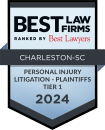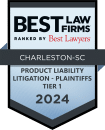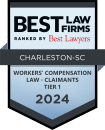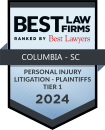
South Carolina is known as a golfing paradise with many golf course communities. However, the popularity of the golf cart extends well beyond the course. Here in the Palmetto State, golf carts have become a widely popular form of transportation in all types of neighborhoods. While fun, they are not risk-free. Golf carts are smaller than average cars and have fewer safety features. This means a collision between a golf cart and another vehicle can be particularly dangerous. Likewise, a golf cart operated by a negligent driver can also cause serious injuries to those riding in it or anyone crossing its path.
Injuries in golf cart accidents can range from cuts and lacerations to bone fractures and traumatic brain injuries (TBIs). Golf cart riders rarely wear seatbelts, because of this, the occupants are often ejected from the vehicles in a collision, sometimes leading to fatal injuries. A recent study showed that children suffer injuries in golf cart accidents at more than three times the rate of adults. The study found that an estimated 156,040 people received emergency room treatment for golf cart-related injuries over a 10-year period.
Negligent drivers may be held accountable by those who have been injured or lost a loved one. For help seeking compensation for your medical expenses after a golf cart accident, call Joye Law Firm today or fill out our online form. Our personal injury attorneys have been helping the unjustly injured in Charleston and across South Carolina for more than 50 years. Let us put that experience to work for you.
Who Can Drive a Golf Cart in South Carolina?
South Carolina requires an individual to be at least 16 years old and to hold a valid driver’s license and a golf cart permit to drive a golf cart on public roads. Golf carts must also be insured and registered with the S.C. Division of Motor Vehicles, and the permit should be on the golf cart.
 Where and When Can a Golf Cart Be Driven in South Carolina?
Where and When Can a Golf Cart Be Driven in South Carolina?
With a license, insurance, and a permit, it is legal to drive a golf cart during daylight hours on roads with posted speeds of 35 mph or less and within four miles of the registered owner’s home or business, within four miles of a point of the entrance to a gated community, or on any street or secondary highway on an island not accessible by a bridge designed for automobile use. A golf cart is allowed to cross a highway at an intersection where the highway has a posted speed limit of more than 35 mph.
South Carolina counties and municipalities can designate portions of barrier islands to allow people to operate golf carts at night if they are equipped with working headlights and rear lights.
Do South Carolina Drinking and Driving Laws Apply to Golf Carts?
Other South Carolina traffic laws apply to golf carts and their occupants the same way they do to cars and trucks. For example, a golf cart operator may be charged with driving under the influence (DUI) if the driver has a blood alcohol concentration of .08% or more. South Carolina state law defines a motor vehicle as any self-propelled vehicle. Even a person operating a golf cart on private property, such as on a golf course, may be charged with a DUI if they’re above the legal limit.
A golf cart operator is also subject to South Carolina’s open container law, which makes it illegal to have an alcoholic beverage open in occupied areas of a motor vehicle while on public roads.
Are Seatbelts Required on Golf Carts?
Currently, seatbelts are not required to be worn while operating or riding in a golf cart in South Carolina. However, in response to golf cart-related deaths, legislation was introduced to change this. Under HB 4147, individuals operating or riding in a golf cart on public streets or highways without wearing seat belts could face a fine of $25. It’s important to note that the language of the bill appears to exempt travel on golf courses.
Negligent Driving and Golf Carts in South Carolina
Though the standard electric golf cart speed is 12-14 miles per hour, they can travel 35 mph or faster with modifications. Problems arise with golf carts when they are not handled with the caution and respect that the operation of any motor vehicle deserves.
The National Golf Cart Association says the use of golf carts as a means of alternative transportation is increasing every year. The largest growth in the sales of golf carts is in the residential setting. Golf carts are also widely used at outdoor public events, often by volunteers who have little to no experience with these vehicles. More teens are now operating golf carts, Too.
Some of the most common causes of golf cart accidents include:
- Inappropriate speed
- Careless driving
- Driving under the influence
- Distracted driving
- Making sharp turns
Many golf cart accidents involve passenger ejections or rollover accidents.
Passenger ejections often occur when a golf cart is being driven too fast, turns too sharply, and/or impacts another vehicle or object. The centrifugal forces generated can cause the passenger to be thrown out of the vehicle. The driver of a golf cart is less likely to be ejected because they may anticipate the forces and also have the steering wheel to hold onto.
Golf carts are unstable and have the propensity to roll over, particularly in sharp turns and while traveling down hills. This is in part because golf carts are typically designed with brakes only on the rear axle.
How We Can Help After a Golf Cart Accident
An individual who causes a golf cart accident may be held liable for injuries that occur in the accident, including injuries among golf cart passengers, pedestrians, cyclists, or others. If a child driving a golf cart causes an accident and injuries, the child’s parents (through liability insurance, in most cases) may be held accountable.
At a public event or on private property, a company or event sponsor may be held liable for a negligent golf cart operator, who should not have been driving a cart. For example, South Carolina’s social host law allows event sponsors to be held responsible for individuals who drink at their event and injure someone.
The South Carolina motor vehicle accident lawyers at Joye Law Firm can work to identify the evidence needed to show fault after a golf cart accident. We can work with you to find and interview witnesses to the accident. In some cases, we work with an accident reconstruction expert to analyze the accident scene, the vehicle, and other evidence to determine what happened.
When we identify liability for a golf cart accident that injured you, we can press responsible insurers to compensate you fairly for such losses as your:
- Medical bills
- Lost wages or diminished earning capacity
- Pain and suffering
- Emotional distress or mental anguish
- Loss of enjoyment of life
If the insurance company refuses to agree to a proper settlement after a golf cart accident, we will be prepared to file a lawsuit on your behalf and present a strong and persuasive case in court.
Joye Law Firm Secures Recovery for Golf Cart Crash Victim
The attorneys and legal staff at Joye Law Firm have extensive experience handling cases involving golf cart accidents caused by negligence. Attorney Ran Stoney of Joye Law Firm’s North Charleston office represented a Hilton Head woman who suffered severe injuries after a golf cart driver overturned the cart she was riding in. Atty. Stoney was able to secure a 1.2 Million dollar settlement for his client. This settlement will cover her medical expenses past and future as well as lost wages and pain and suffering. Read more details about this case.
Contact Our South Carolina Golf Cart Accident Attorneys
If you have been seriously injured in a golf cart accident that someone else caused in Charleston or elsewhere in South Carolina, you need experienced lawyers who know South Carolina’s golf cart laws. You need legal representation that you can trust to pursue just compensation for you. For a no-cost consultation, call Joye Law Firm at 888-324-3100 or fill out our online case evaluation form today.




























